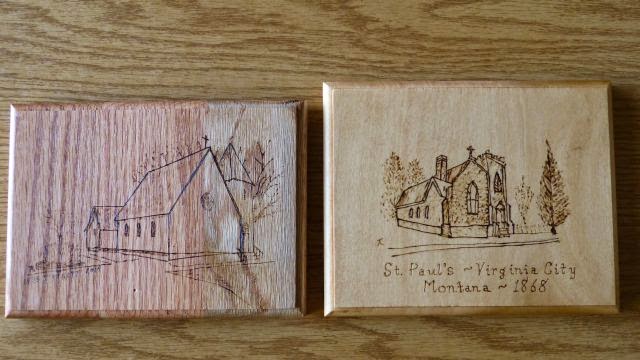“If I tell you I’m
good, you would probably think I am boasting. If I tell you I’m no good, you
KNOW I’m lying.” Bruce Lee
When I was growing up, there were occasions when I was not
on my best behavior. I know that must come as a shock to some of you, but it is
true. When I was caught misbehaving, my parents would say, “Straighten up,
young man!” They generally had a few more choice words added to the mix to help
me understand how serious they were, and it worked. I would turn away from my
transgressions – often for minutes or even hours – until they were out of sight
and out of mind. In the fullness of time, I would once again be me.
We are a mix, of course. We are all a mix of good and bad,
noble and perverse. We make every effort to be relatively decent, but sometimes
we fall down on the job and are just barely tolerable.
The other day I was doing some pyrography (wood burning). I
was burning an image of a local church onto a piece of oak. The picture came
out pretty good, but I hadn’t noticed the defects in the wood I was using. It
wasn’t a good piece of oak. The board had been manufactured by gluing several dissimilar
pieces of oak together. If the board is going to become a shelf, that’s not a
problem. But to serve as the backdrop to a piece of art I was creating, the
result was disastrous.
The problem is that I hadn’t considered all aspects I needed
to in choosing what to use in my wood-burning. I am a neophyte, and making
mistakes is part of the process of learning. I don’t have to beat myself up
over it.
No, I made a mistake, and now I know I must choose my wood
more carefully. My goal is to make good – not perfect – art. My goal is to
become a better – not a perfect – craftsman.
I did another, similar project using a board of poplar, and
the result was much better. Learning from my earlier experiences, I prepared
the wood ahead of time, sanding it smooth and squaring off all of the cuts. I
looked at the grains and the colorations of the planks and arranged my pencil
lines to take better advantages of those traits. I spent more time setting up
and framing the drawings so they would look more pleasing to those who would be
viewing them. In short, I took what I was learning and tried to apply that knowledge
to my current work, and the results are an improvement.
It seems that is some of what it means to “straighten out.”
It isn’t a matter of being perfect, but of working to become better.
This is Holy Week, and for many, that means the end of Lent
and preparing for Easter. I’m happy to report I’ve already got my Peeps in
hand! But before we jump into Easter, I think it would be helpful for each of
us to review these past forty days and ask how we’ve done. What have we learned
about our relationship with God, neighbor, and self?
In preparing for company, we always straighten up the house.
That generally means tossing stuff into closets and cupboards – out of sight
and out of mind. It seems, though, that Lent isn’t about hiding all our junk as
much as it is about clearing OUT much of what separates us from the love of
God, neighbor, and self.
It occurs to me that there isn’t much a piece of lousy oak
can do to change. It did not choose to be what it was: scraps glued together to
form a board, but in the hands of the right wood-worker, it’s able to fulfill
its destiny. So can we; we are in the hands of a master carpenter who did his
finest work on the roughest wood there was – the Cross – converting scraps into
saints!
Maybe we should worry less about becoming something we
aren’t, and letting God make of us what we are “in Him”. God’s done a lot more
with a lot less. I have faith in His skills and believe in his hands Church-life
could be a bit more Poplar and useful in this, our valley.
.jpg)

No comments:
Post a Comment